The Psychology of Mass Media
Fielding Graduate University Pioneered the Nation’s First Media Psych PhD

How did the movie Black Panther impact the impressionable African-American teenage mind? Are selfies bad or good? What do you do when you hate your partner’s social media presence?
All good questions for the neighborhood media psychologist.
Yes, that’s now a thing thanks to Santa Barbara–based Fielding Graduate University, which pioneered the nation’s first PhD program in media psychology in 2002. Since then, Fielding faculty and grads are helping to shape the national conversation on how media influences human behavior, from neuromarketing and brand psychology to transmedia storytelling.
In essence, media psychologists shed light on how media and technology influence the way people connect and make meaning of their lives, explained Fielding Media Psychology Program Director Jerri Lynn Hogg.
Hogg is currently buried in research on how media and technology use is impacting childhood development. She’s tapping the input of physicians, psychologists, educators, and other professionals working with children.
“Technology and new media are being used by children at younger and younger ages and have become an issue of national interest and concern,” said Hogg.
Fielding Media Psychology faculty member Dr. Karen Dill-Shackleford has researched the effects of film and TV on society. She’s testified twice before Congress and has consulted on the role of the media in people’s everyday understanding of “the truth.” Here is Dr. Dill-Shackleford’s take on these popular productions:

Black Panther: Fielding partnered with the LEAD program (LEADprogram.org), which is an educational organization that serves youth from underserved communities, helping them to prepare for and get accepted to excellent universities. Our team studied a group of LEAD students who were, on average, 17 years of age. Researchers from our team traveled to a number of universities where LEAD holds summer programs, such as Duke and Penn State. Our researchers watched the film Black Panther with the youth. We found that for black youth, levels of empowerment and well-being both increased after watching Black Panther.

Doctor Who: The sci-fi show Doctor Who has a great fan following. The main character, “The Doctor,” has always been played by a man, until now. We studied the feelings and beliefs of Doctor Who fans during the lead-up to the first female Doctor. Fans who scored higher on two measures of sexism also reported feeling more negative and less positive about the prospect of a female Doctor. Fans with higher sexism scores reported lower intentions of watching the show when it switched to a female lead. Most fans, however, were positive about the change.
Mad Men: Mad Men is an award-winning drama about advertising executives in 1960s New York. The show explores sexism and racism in the business world of that era. It also explores the lives of some flawed individuals struggling with personal and relationship issues. Our research analyzed how fans thought about their favorite characters and story lines. We found that fans use the show to think about real-life values and problems such as what makes a good parent, a good spouse, and a good person. Many were frustrated when characters made repeated mistakes and cheered for them to learn and grow.
Learn more about the Media Psychology Research Center at mprcenter.org and about Fielding at fielding.edu.



